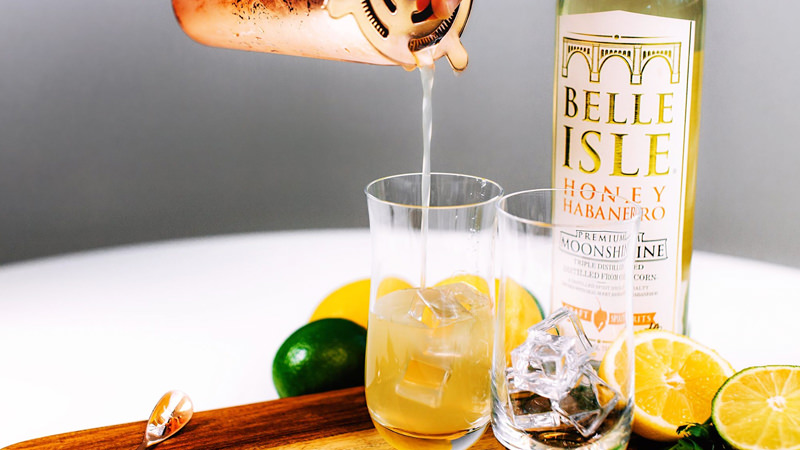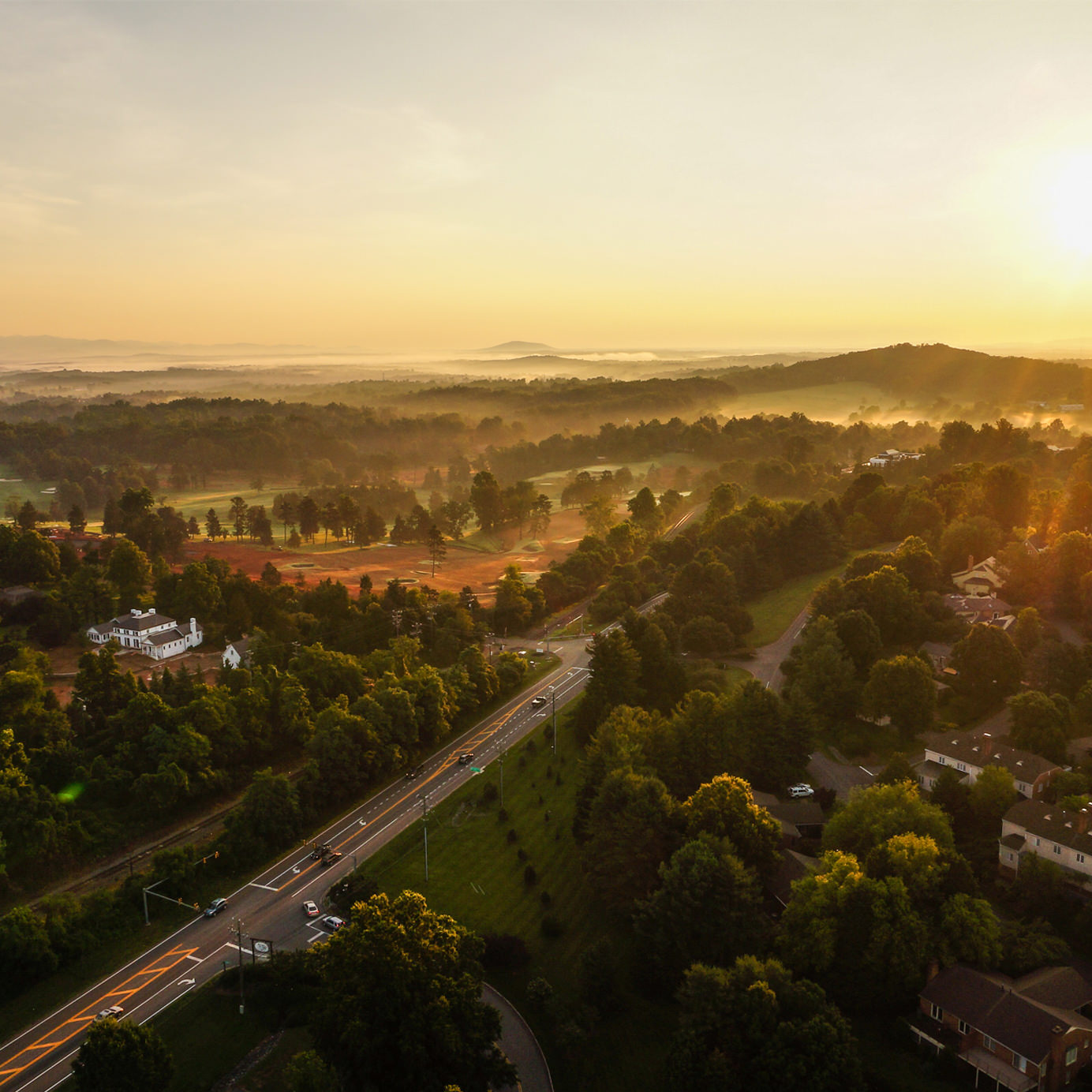Virginia is in many ways the true birthplace of American whiskey.
As we let that sink in, note that Kentucky will always be known as America’s preeminent whiskey destination. But its eastern neighbor is giving it a run for its money. Virginia distilleries bottle some of the best American whiskeys available today, and, more surprisingly, its whiskey heritage actually predates Kentucky’s.
In 1620, Virginia colonist George Thorpe wrote a letter back to England noting that he had found a way to make a “good drinke of Indian corne.” Historians suggest Thorpe was referring to distilled corn whiskey, meaning that the letter marks the first recorded evidence of whiskey in America. Once Scots-Irish immigrants began settling in America at the end of the 18th century – bringing their whiskey-making knowledge with them – Virginia’s whiskey industry truly started booming.
Contrary to popular lore, bourbon also traces its heritage to Virginia rather than Kentucky. In 1789 a preacher-turned-entrepreneur, Elijah Craig, is said to have started aging corn whiskey in barrels in the western region of Virginia. That area later became part of Kentucky’s Fayette County, and eventually became Scott County, Kentucky, in 1792.
By the early 1800s, thousands of distilleries were operating in Virginia, with the lion’s share making whiskey from abundant local crops like rye and corn. The Civil War unfortunately devastated much of Virginia’s rich distilling culture, with both crops and distilleries destroyed during the fighting. And once Prohibition took hold in Virginia in the early 1900s, whiskey-making shifted mostly underground, spawning the illicit moonshining culture that has thrived in the Blue Ridge Mountain region pretty much ever since.
But over the past few decades, Virginia’s craft whiskey scene has started to revive itself. The commonwealth’s distilleries — not to mention its many historic whiskey landmarks — now form their own unofficial whiskey trail, comprising some of the most diverse and innovative whiskeys on the market. Those ready to sip on American history should start with these highlights.
For the bourbon connoisseur
This year, the A. Smith Bowman Distillery in Fredericksburg, Virginia beat out its Kentucky competitors at the 2017 World Whiskies Awards. Its John J. Bowman Single Barrel Bourbon was crowned the “World’s Best Bourbon.” Even more astonishingly, the distillery’s Abraham Bowman Port Finished Bourbon took home the same award at the 2016 World Whiskies Awards.
Smith Bowman is unique because it triple-distills its bourbon and then ages it in upright barrels. The brick warehouse in which the bourbon ages is located in Virginia’s Tidewater region, which has distinct humidity and temperature characteristics that differentiate it from landlocked Kentucky. The distillery offers free tours and tastings, including the opportunity to sample some products only available on site.
Smith Bowman isn’t the only Virginia distillery racking up hardware. The Virginia Distillery Company, nestled in the Blue Ridge Mountains near Lovingston, also received recognition at this year’s World Whiskies for its Virginia-Highland Whiskey. Consisting of a blend of Scottish and Virginia whiskeys, this Scotch-style spirit is finished in port casks sourced from nearby wineries. The distillery’s Blue Ridge location makes it an idyllic stop any time of year — the tasting room features an indoor fireplace for wintertime sipping, and summertime guests can enjoy a 2,000-square-foot outdoor patio that overlooks the rolling hillsides.
Smith Bowman: Location
The Virginia Distillery Company: Location
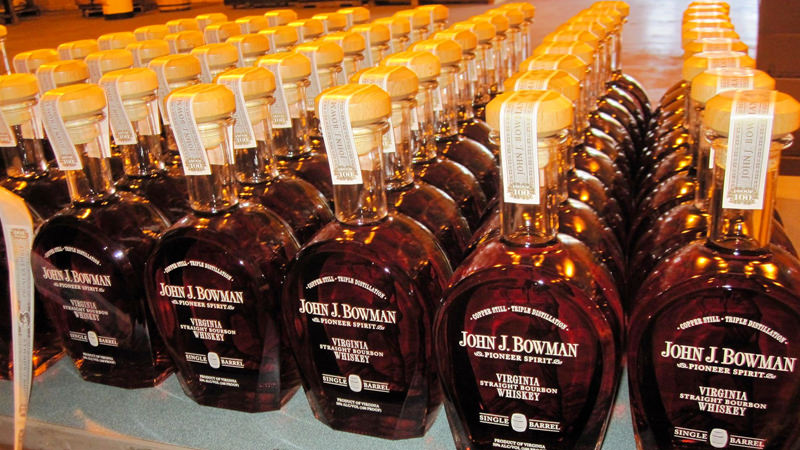
For the rye fan
Ultimately, it’s not single-malt whiskey or even bourbon that deserve recognition as Virginia’s — and America’s — original spirit, but rye. The spirit is currently undergoing a dramatic rebirth, and Virginia distilleries have been integral to rye’s revival.
Catoctin Creek Distilling Co. in Purcellville, Virginia, just outside of Washington, D.C., produces a variety of innovative rye whiskeys. Its flagship Roundhouse Rye is the distillery’s version of a pre-Prohibition rye, made with a 100-percent rye mash bill. It happens to be one of the few organic whiskeys on the market today. Catoctin Creek also has cask-proof ryes with various seasonal expressions and finishes, including a maple syrup barrel finish for fall and a brandy barrel finish for spring. The distillery’s tasting room has a charming warehouse feel, with brick walls and a large central bar, making it a particularly inviting place to sample spirits and cocktails.
Copper Fox, which has locations in Sperryville and Williamsburg, is also garnering attention for its rye. The mash bill on Copper Fox’s rye is two-thirds rye and one-third malted barley, and the distillery is one of only a handful in North America to employ the Scottish method of floor malting its barley. After the malting process, Copper Fox smokes its barley in kilns with applewood and cherrywood; it also incorporates applewood at the barreling stage. This use of fruitwood in the smoking and aging process makes for an innovative, almost wholly unique rye. Both distillery locations offer free tours and tastings.
Catoctin Creek Distilling Co.: Location
Copper Fox: Location
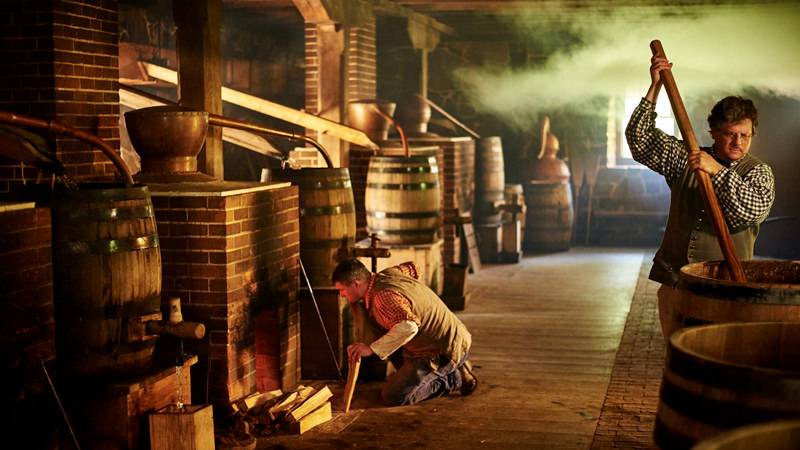
For the history nerd
Virginia’s most famous citizen, George Washington, was also a whiskey distiller. His operation at his Mount Vernon plantation was launched in 1797 and became one of the largest in the country.
Today, Washington’s Mount Vernon distillery has been rebuilt and produces the first president’s original rye recipe, made with a mash bill of 60 percent rye, 35 percent corn, and 5 percent malted barley. Visitors can swing by the distillery and nearby grist mill to learn about the old-fashioned whiskey-making methods of Washington’s time and taste his rye, which was recently named Virginia’s official spirit.
But Virginia’s whiskey heritage predates even Washington. Today you can visit the spot where it all started, at George Thorpe’s Berkeley Plantation on the James River. And if learning about Thorpe’s “drinke of Indian corne” makes you thirsty, you can visit Eight Shires Coloniale American Distillery in nearby Williamsburg, which is dedicated to researching and preserving early distillation history. Eight Shires also produces colonial-era spirits, including bourbon made with heritage Indian corn. The distillery provides free tastings as well as an education in 17th- and 18th-century distillation techniques.
Mount Vernon: Location
Berkeley Plantation: Location
Eight Shires Coloniale American Distillery: Location
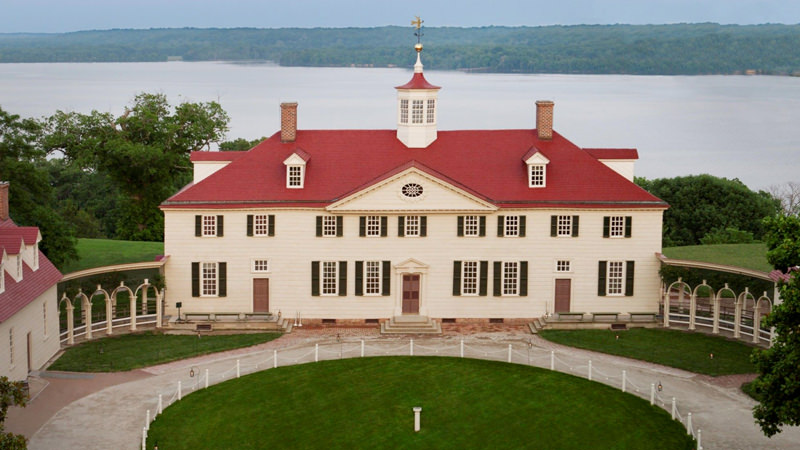
For the wildcard drinker
Usually whiskey is the exclusive provenance of dark-spirits aficionados. But Belle Isle Craft Spirits in Richmond produces unaged corn whiskey, or moonshine, in a remarkably sophisticated way. While moonshine conjures up negative connotations for many people, Belle Isle uses triple-distilled corn whiskey, along with organic ingredients and flavoring, to create a subtle, sophisticated spirit.
The distillery positions its unaged whiskey as a competitor to vodka, and features such offerings as Honey Habanero, which is infused with Virginia honey and organic habaneros. Bars from Virginia to New Orleans stock these distinctive spirits; and although Belle Isle doesn’t have its own tasting room yet, you can find its products at bars and liquor stores throughout Virginia.
